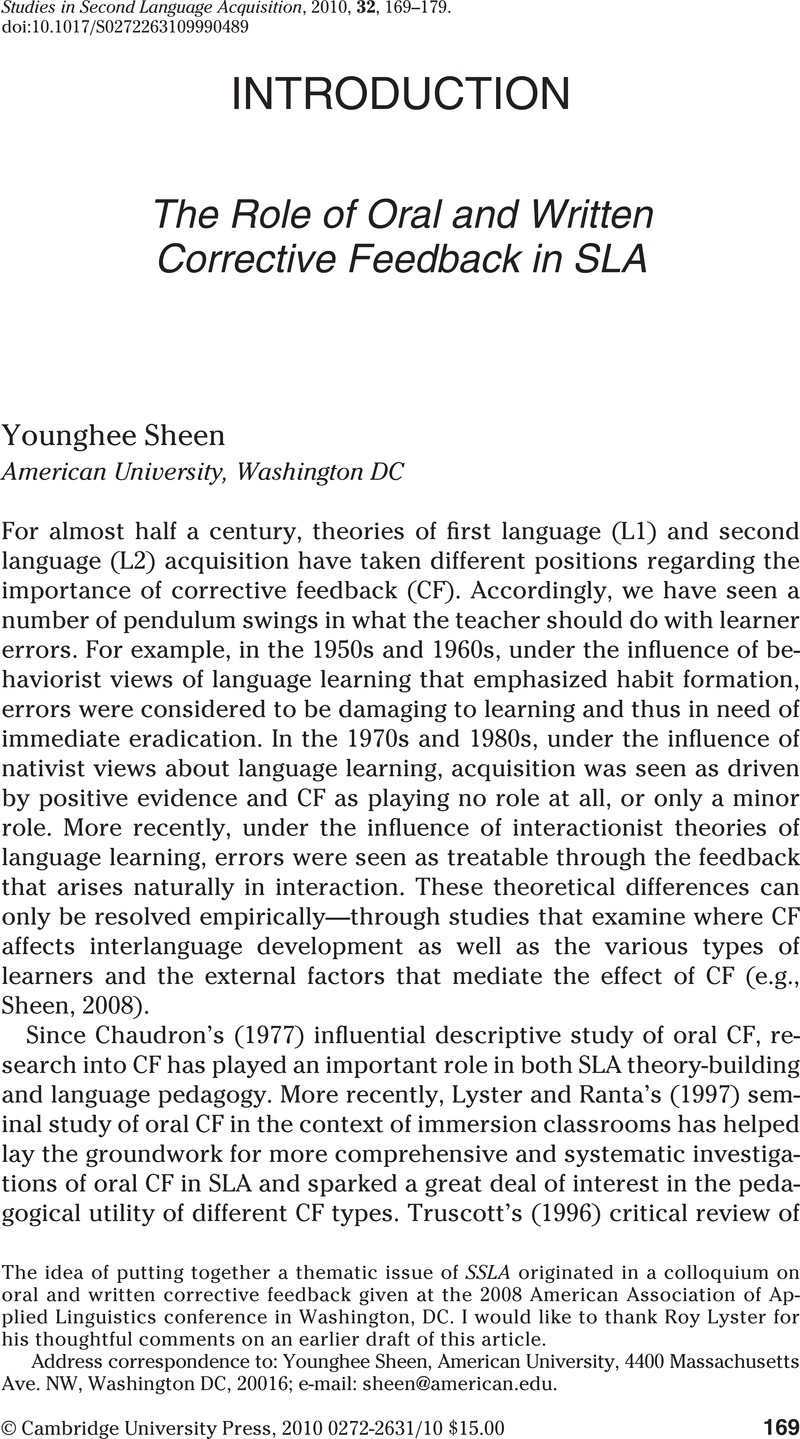Crossref Citations
This article has been cited by the following publications. This list is generated based on data provided by Crossref.
Ji-Young Jung
2010.
A Classroom Study on the Efficacy of Interactional Feedback for Korean Particles.
Journal of Korean Language Education,
Vol. 21,
Issue. 4,
p.
255.
Penning de Vries, Bart
Cucchiarini, Catia
Strik, Helmer
and
van Hout, Roeland
2011.
Interdisciplinary Approaches to Adaptive Learning. A Look at the Neighbours.
Vol. 126,
Issue. ,
p.
1.
van Doremalen, Joost
Strik, Helmer
and
Cucchiarini, Catia
2011.
Interdisciplinary Approaches to Adaptive Learning. A Look at the Neighbours.
Vol. 126,
Issue. ,
p.
56.
Shirazi, Zahra Rastegar Haghighi
and
Sadighi, Firooz
2012.
Implicit Versus Explicit Feedback in Classroom: An Experimental Study.
Journal of Language Teaching and Research,
Vol. 3,
Issue. 3,
Sato, Masatoshi
and
Ballinger, Susan
2012.
Raising language awareness in peer interaction: a cross-context, cross-methodology examination.
Language Awareness,
Vol. 21,
Issue. 1-2,
p.
157.
Ortega, Lourdes
2012.
Epistemological diversity and moral ends of research in instructed SLA.
Language Teaching Research,
Vol. 16,
Issue. 2,
p.
206.
Slater, Tammy
and
Li, Jinrong
2012.
The Encyclopedia of Applied Linguistics.
Junqueira, Luciana
and
Kim, YouJin
2013.
Exploring the Relationship Between Training, Beliefs, and Teachers’ Corrective Feedback Practices: A Case Study of a Novice and an Experienced ESL Teacher.
The Canadian Modern Language Review,
Vol. 69,
Issue. 2,
p.
181.
Panahi, Parva
Birjandi, Parviz
and
Azabdaftari, Behrooz
2013.
Toward a sociocultural approach to feedback provision in L2 writing classrooms: the alignment of dynamic assessment and teacher error feedback.
Language Testing in Asia,
Vol. 3,
Issue. 1,
Pawlak, Mirosław
2013.
Teaching and Researching English Accents in Native and Non-native Speakers.
p.
85.
Pawlak, Mirosław
2014.
Awareness in Action.
p.
69.
Pawlak, Mirosław
2014.
Language Learning, Discourse and Communication.
p.
3.
Abbasian, Gholam-Reza
and
Bahmani, Poopak
2014.
Retrospective vs. Prospective Corrective Feedback Impacts on Developing EFL Learners’ Writing Ability and Learner Autonomy.
Theory and Practice in Language Studies,
Vol. 4,
Issue. 6,
Moghaddam, Seyyed Reza Mousavi
and
Behjat, Fatemeh
2014.
Overt-correction vs. Recasts and Grammar Performance of Iranian Male Learners of English.
Journal of Language Teaching and Research,
Vol. 5,
Issue. 4,
Martínez Agudo, Juan de Dios
2015.
How do Spanish EFL learners perceive grammar instruction and corrective feedback?.
Southern African Linguistics and Applied Language Studies,
Vol. 33,
Issue. 4,
p.
411.
Tai, Hung-Cheng
Lin, Wen-Chuan
and
Yang, Shu Ching
2015.
Exploring the Effects of Peer Review and Teachers' Corrective Feedback on EFL Students' Online Writing Performance.
Journal of Educational Computing Research,
Vol. 53,
Issue. 2,
p.
284.
Yousefi, Valiollah
2015.
Corrective feedback preferences among Iranian EFL students.
International Journal of Research Studies in Language Learning,
Vol. 4,
Issue. 5,
Tai, Hung-Cheng
Pan, Mei-Yu
and
Lee, Bih-O
2015.
Applying Technological Pedagogical and Content Knowledge (TPACK) model to develop an online English writing course for nursing students.
Nurse Education Today,
Vol. 35,
Issue. 6,
p.
782.
Derakhshan, Ali
and
Karimi, Elham
2015.
The Interference of First Language and Second Language Acquisition.
Theory and Practice in Language Studies,
Vol. 5,
Issue. 10,
p.
2112.
Su, Ting
and
Tian, Jinping
2016.
Research on Corrective Feedback in ESL/EFL Classrooms.
Theory and Practice in Language Studies,
Vol. 6,
Issue. 2,
p.
439.



